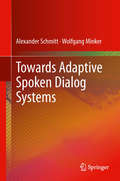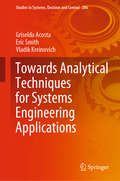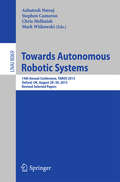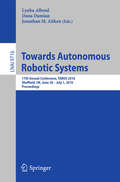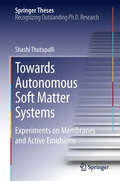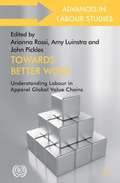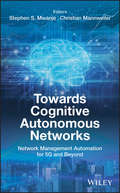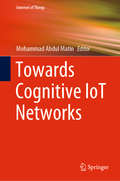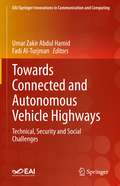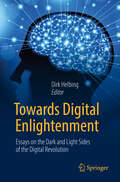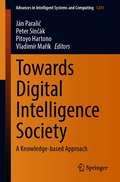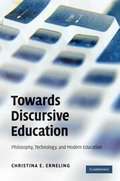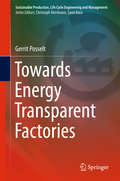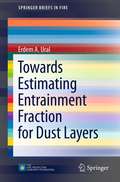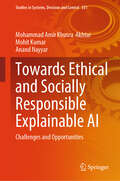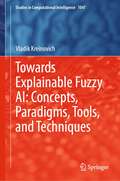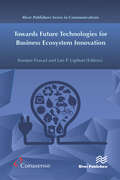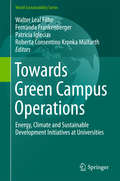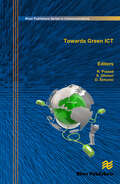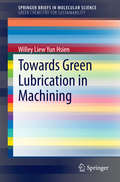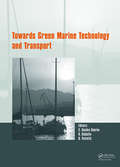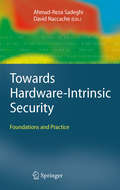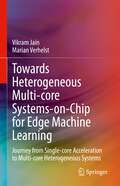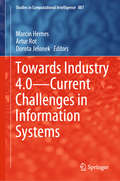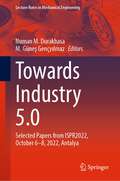- Table View
- List View
Towards Adaptive Spoken Dialog Systems
by Alexander Schmitt Wolfgang MinkerIn Monitoring Adaptive Spoken Dialog Systems, authors Alexander Schmitt and Wolfgang Minker investigate statistical approaches that allow for recognition of negative dialog patterns in Spoken Dialog Systems (SDS). The presented stochastic methods allow a flexible, portable and accurate use. Beginning with the foundations of machine learning and pattern recognition, this monograph examines how frequently users show negative emotions in spoken dialog systems and develop novel approaches to speech-based emotion recognition using hybrid approach to model emotions. The authors make use of statistical methods based on acoustic, linguistic and contextual features to examine the relationship between the interaction flow and the occurrence of emotions using non-acted recordings several thousand real users from commercial and non-commercial SDS. Additionally, the authors present novel statistical methods that spot problems within a dialog based on interaction patterns. The approaches enable future SDS to offer more natural and robust interactions. This work provides insights, lessons and inspiration for future research and development, not only for spoken dialog systems, but for data-driven approaches to human-machine interaction in general.
Towards Analytical Techniques for Systems Engineering Applications (Studies in Systems, Decision and Control #286)
by Eric Smith Vladik Kreinovich Griselda AcostaThis book is intended for specialists in systems engineering interested in new, general techniques and for students and practitioners interested in using these techniques for solving specific practical problems. For many real-world, complex systems, it is possible to create easy-to-compute explicit analytical models instead of time-consuming computer simulations. Usually, however, analytical models are designed on a case-by-case basis, and there is a scarcity of general techniques for designing such easy-to-compute models. This book fills this gap by providing general recommendations for using analytical techniques in all stages of system design, implementation, testing, and monitoring. It also illustrates these recommendations using applications in various domains, such as more traditional engineering systems, biological systems (e.g., systems for cattle management), and medical and social-related systems (e.g., recommender systems).
Towards Autonomous Robotic Systems
by Mark Witkowski Ashutosh Natraj Stephen Cameron Chris MelhuishThis book constitutes the refereed proceedings of the 14th Conference on Advances in Autonomous Robotics, TAROS 2013, held in Oxford, UK, in August 2013. The 36 revised full papers presented together with 25 extended abstracts were carefully reviewed and selected from 89 submissions. The papers cover various topics such as artificial intelligence, bio-inspired and aerial robotics, computer vision, control, humanoid and robotic arm, swarm robotics, verification and ethics.
Towards Autonomous Robotic Systems
by Lyuba Alboul Dana Damian Jonathan M. AitkenThis book constitutes the refereed proceedings of the 17th Annual Conference on Towards Autonomous Robotics, TAROS 2016, held in Sheffield UK, in June/July 2016. The 23 revised full papers presented together with 15 short papers were carefully reviewed and selected from 56 submissions. The overall program covers various aspects of robotics, including navigation, planning, sensing and perception, flying and swarm robots, ethics, humanoid robotics, human-robot interaction, and social robotics.
Towards Autonomous Soft Matter Systems: Experiments on Membranes and Active Emulsions
by Shashi ThutupalliThis book focuses on the assembly, organization and resultant collective dynamics of soft matter systems maintained away from equilibrium by an energy flux. Living matter is the ultimate example of such systems, which are comprised of different constituents on very different scales (ions, nucleic acids, proteins, cells). The result of their diverse interactions, maintained using the energy from physiological processes, is a fantastically well-organized and dynamic whole. This work describes results from minimal, biomimetic systems and primarily investigates membranes and active emulsions, as well as key aspects of both soft matter and non-equilibrium phenomena. It is shown that these minimal reconstitutions are already capable of a range of complex behaviour such as nonlinear electric responses, chemical communication and locomotion. These studies will bring us closer to a fundamental understanding of complex systems by reconstituting key aspects of their form and function in simple model systems. Further, they may also serve as the first technological steps towards artificial soft functional matter.
Towards Better Work
by John Pickles Arianna Rossi Amy LuinstraGlobalization of production has created opportunities and challenges for developing country producers and workers. This volume provides solutions-oriented approaches for promoting improved working conditions and labour rights in the apparel industry.
Towards Cognitive Autonomous Networks: Network Management Automation for 5G and Beyond
by Stephen S MwanjeLearn about the latest in cognitive and autonomous network management Towards Cognitive Autonomous Networks: Network Management Automation for 5G and Beyond delivers a comprehensive understanding of the current state-of-the-art in cognitive and autonomous network operation. Authors Mwanje and Bell fully describe today's capabilities while explaining the future potential of these powerful technologies. This book advocates for autonomy in new 5G networks, arguing that the virtualization of network functions render autonomy an absolute necessity. Following that, the authors move on to comprehensively explain the background and history of large networks, and how we come to find ourselves in the place we're in now. Towards Cognitive Autonomous Networks describes several novel techniques and applications of cognition and autonomy required for end-to-end cognition including: • Configuration of autonomous networks • Operation of autonomous networks • Optimization of autonomous networks • Self-healing autonomous networks The book concludes with an examination of the extensive challenges facing completely autonomous networks now and in the future.
Towards Cognitive IoT Networks (Internet of Things)
by Mohammad Abdul MatinThis book gathers state-of-the-art research contributions written by academics and researchers, which address emerging trends in system design and implementation for the Internet of Things (IoT), and discuss how to promote IoT technologies and applications. The book is chiefly intended for researchers and academics who want to get caught up with the latest trends in enabling technologies for IoT and related applications and services. However, it also includes chapters on the fundamentals of IoT, offering essential orientation for general readers.
Towards Connected and Autonomous Vehicle Highways: Technical, Security and Social Challenges (EAI/Springer Innovations in Communication and Computing)
by Fadi Al-Turjman Umar Zakir Abdul HamidThis book combines comprehensive multi-angle discussions on fully connected and automated vehicle highway implementation. It covers the current progress of the works towards autonomous vehicle highway development, which encompasses the discussion on the technical, social, and policy as well as security aspects of Connected and Autonomous Vehicles (CAV) topics. This, in return, will be beneficial to a vast amount of readers who are interested in the topics of CAV, Automated Highway and Smart City, among many others. Topics include, but are not limited to, Autonomous Vehicle in the Smart City, Automated Highway, Smart-Cities Transportation, Mobility as a Service, Intelligent Transportation Systems, Data Management of Connected and Autonomous Vehicle, Autonomous Trucks, and Autonomous Freight Transportation.Brings together contributions discussing the latest research in full automated highway implementation;Discusses topics such as autonomous vehicles, intelligent transportation systems, and smart highways;Features contributions from researchers, academics, and professionals from a broad perspective.
Towards Digital Enlightenment: Essays on the Dark and Light Sides of the Digital Revolution
by Dirk HelbingThis new collection of essays follows in the footsteps of the successful volume Thinking Ahead - Essays on Big Data, Digital Revolution, and Participatory Market Society, published at a time when our societies were on a path to technological totalitarianism, as exemplified by mass surveillance reported by Edward Snowden and others. Meanwhile the threats have diversified and tech companies have gathered enough data to create detailed profiles about almost everyone living in the modern world - profiles that can predict our behavior better than our friends, families, or even partners. This is not only used to manipulate peoples’ opinions and voting behaviors, but more generally to influence consumer behavior at all levels. It is becoming increasingly clear that we are rapidly heading towards a cybernetic society, in which algorithms and social bots aim to control both the societal dynamics and individual behaviors. However there are also silver linings: most of the threats that have accumulated over the past years have been identified and regulations are on the way to being introduced. Furthermore, entirely novel approaches based on blockchain technology and other developments derived from complexity science offer the possibility of entirely redefining collective trust and building platforms to support our core societal values.
Towards Digital Intelligence Society: A Knowledge-based Approach (Advances in Intelligent Systems and Computing #1281)
by Vladimír Mařík Pitoyo Hartono Peter Sinčák Ján ParaličThis book aims to provide readers with up-to-date knowledge on how to make these technologies smarter. Humanity is now going through difficult times to fight the Covid-19 pandemic. Simultaneously, in these difficult times of physical separation, we can also realize how much digital society technology helps us cope with many difficulties that bring us this time. The authors focus on selected research challenges for intelligent digital society and state-of-the-art methods of how to face them. The book’s subtitle suggests that a core concept that the reader can study from various points of view in particular book chapters is the knowledge. The knowledge that can help us intelligently face different digital society challenges (Part I of this book); the knowledge extracted from available big data employing intelligent analysis techniques (Part II). For efficient processing and analysis of data, there is a strong need for smart data and information modeling techniques (Part III).
Towards Discursive Education: Philosophy, Technology, and Modern Education
by Christina E. ErnelingAs technology continues to advance, the use of computers and the Internet in educational environments has immensely increased. But just how effective has their use been in enhancing children's learning? In this thought-provoking book, Christina E. Erneling conducts a thorough investigation of scholarly journal articles on how computers and the Internet affect learning. She critiques the influential pedagogical theories informing the use of computers in schools - in particular those of Jean Piaget and 'theory of mind' psychology. Erneling introduces and argues for a discursive approach to learning based on the philosophy of Ludwig Wittgenstein and the psychology of Lev Vygotsky. This book not only addresses an urgent pedagogical problem in depth, but also challenges dominant assumptions about learning in both developmental psychology and cognitive science.
Towards Energy Transparent Factories
by Gerrit PosseltThis monograph provides a methodological approach for establishing demand-oriented levels of energy transparency of factories. The author presents a systematic indication of energy drivers and cost factors, taking into account the interdependencies between facility and production domains. Particular attention is given to energy flow metering and monitoring. Readers will also be provided with an in-depth description of a planning tool which allows for systematically deriving suitable metering points in complex factory environments. The target audience primarily comprises researchers and experts in the field of factory planning, but the book may also be beneficial for graduate students.
Towards Estimating Entrainment Fraction for Dust Layers
by Erdem A. UralTowards Estimating Entrainment Fraction for Dust Layers closely examines the factors that can affect the assessment of a dust hazard, and outlines a new strawman method designed to help practitioners estimate the fraction of the dust accumulations that can become airborne. This book also aims to provide aid in the removal of aerodynamic disturbances of dust particles or agglomerates from layers or piles of cohesive and non-cohesive dusts. Towards Estimating Entrainment Fraction for Dust Layers is designed for practitioners as a reference guide for improving dust hazard assessment. Researchers working in a related field will also find the book valuable.
Towards Ethical and Socially Responsible Explainable AI: Challenges and Opportunities (Studies in Systems, Decision and Control #551)
by Anand Nayyar Mohit Kumar Mohammad Amir Akhtar"Dive deep into the evolving landscape of AI with 'Towards Ethical and Socially Responsible Explainable AI'. This transformative book explores the profound impact of AI on society, emphasizing transparency, accountability, and fairness in decision-making processes. It offers invaluable insights into creating AI systems that not only perform effectively but also uphold ethical standards and foster trust. Essential reading for technologists, policymakers, and all stakeholders invested in shaping a responsible AI future."
Towards Explainable Fuzzy AI: Concepts, Paradigms, Tools, and Techniques (Studies in Computational Intelligence #1047)
by Vladik KreinovichModern AI techniques –- especially deep learning –- provide, in many cases, very good recommendations: where a self-driving car should go, whether to give a company a loan, etc. The problem is that not all these recommendations are good -- and since deep learning provides no explanations, we cannot tell which recommendations are good. It is therefore desirable to provide natural-language explanation of the numerical AI recommendations. The need to connect natural language rules and numerical decisions is known since 1960s, when the need emerged to incorporate expert knowledge -- described by imprecise words like "small" -- into control and decision making. For this incorporation, a special "fuzzy" technique was invented, that led to many successful applications. This book described how this technique can help to make AI more explainable.The book can be recommended for students, researchers, and practitioners interested in explainable AI.
Towards Future Technologies for Business Ecosystem Innovation
by Ramjee Prasad Leo P. LigthartTowards Future Technologies for Business Ecosystem Innovation describes CONASENSE within the broad platform of the CTIF Global Capsule (CGC) covering future technologies and its enablers, smart cities, telemedicine, crowd computing, satellite, unmanned air vehicles , cooperative wireless sensor network, remotely piloted aircraft system, network neutrality as well as virtual business model
Towards Green Campus Operations: Energy, Climate And Sustainable Development Initiatives At Universities (World Sustainability Series)
by Walter Leal Filho Fernanda Frankenberger Patricia Iglecias Roberta Consentino Kronka MülfarthMatters related to sustainable development, albeit global in nature, are best handled at the local level. This line of thinking is particularly true to the higher education context, where the design and implementation of sustainability initiatives on campuses can demonstrate how a given university translates the principles of sustainable development into practice, at the institutional level. Yet, there is a paucity of specific events where a dialogue among sustainability academics and practitioners concerned with a) research, projects b) teaching and c) planning and infra-structure leading to campus greening takes place, so as to allow a transdisciplinary and cross-sectoral exchange of ideas and experiences on the issues, matters and problems at hand. It is against this background that this book has been prepared. It is one of the outcomes of the “First Symposium on Sustainability in University Campuses” (SSUC-2017) organised by the University of São Paulo in Brazil, Manchester Metropolitan University (UK), the Research and Transfer Centre “Applications of Life Sciences” of the Hamburg University of Applied Sciences (Germany), and the Inter-University Sustainable Development Research Programme (IUSDRP). This book showcases examples of campus-based research and teaching projects, regenerative campus design, low-carbon and zero carbon buildings, waste prevention, and resilient transport, among others. It also demonstrates the role of campuses as platforms for transformative social learning and research, and explores the means via which university campuses can be made more sustainable. The aims of this publication are as follows: i. to provide universities with an opportunity to obtain information on campus greening and sustainable campus development initiatives from round the world; ii. to document and promote information, ideas and experiences acquired in the execution of research, teaching and projects on campus greening and design, especially successful initiatives and good practice; iii. to introduce methodological approaches and projects which aim to integrate the topic of sustainable development in campus design and operations. This book entails contributions from researchers and practitioners in the field of campus greening and sustainable development in the widest sense, from business and economics, to arts, administration and environment.
Towards Green ICT (River Publishers Series In Communications Ser.)
by Homayoun Nikookar Peter Koch Ramjee Prasad Peter Gorm Larsen Peter Jung Masanori Hariyama Petar Popovski Dina Šimunić Yariv Taran Hiroyuki Morikawa Peter Lindgren Leo P. Ligthart Knud Erik Skouby Shingo Ohmori Dina Šimunic L. E. Mägi M. G. Gustafsson A. Kramers Hideaki Imaizumi Takeshi Mizuike Keizo Sugiyama Kishore Ramareddy Parag Pruthi Iwona Windekilde Christoph Spiegel Sebastian Rickers Woojin Shim Rami Lee Jae Hwang Yu Rasmus Krigslund Iskra Dukovska-Popovska Gert F. Pedersen Boris Manev Rasmus Hjorth Nielsen Albena Mihovska Ole Brun Madsen Alberto Nannarelli Nobuo Nakajima L. Jorguseski R. Litjens J. Oostveen H. Zhang John Rohde Sune Wolff Thomas Skjødeberg Toftegaard Kenneth Lausdahl Augusto Ribeiro Poul Ejnar Rovsing Masahide Sasaki Atsushi Waseda Masahiro Takeoka Mikio Fujiwara Hidema Tanaka Masahiro Umehira Michitaka Kameyama Hideaki Furukawa Naoya Wada Xiaohua Lian Kristin Saughaug Subria ClemensenICT is playing an increasingly important role in both business and individual's private life. It has increased international interconnectedness and speed up the process of globalization. But on the other side the total energy consumption by the communication and networking devices and the relevant global CO emission is increasing exponentially. ICT has, in many ways, a vital role to play. It accounts for about two percent of global CO emissions. Telecommunications applications can have a direct, tangible impact on lowering greenhouse gas emissions, power consumption, and achieve efficient recycling of equipment waste.This book is the outcome of the special session on Green Communications at 'The 12th International Symposium on Wireless Personal Multimedia Communications' (WPMC) held in September '09 in Sendai, Japan. To the best of the editors' knowledge this is the first book on the Green Information and Communication Technologies (ICT) and can be considered a milestone and a key-tool aimed at driving the industrial, scientific and academic efforts of the international community to guarantee a greener future to the whole planet.
Towards Green Lubrication in Machining
by Willey Liew Yun HsienThe book gives an overview of environmental friendly gaseous and vapour, refrigerated compressed gas, solid lubricant, mist lubrication, minimum quantity lubrication (MQL) and vegetable oils that can be used as lubricants and additives in industrial machining applications. This book introduces vegetable oils as viable and good alternative resources because of their environmental friendly, non-toxic and readily biodegradable nature. The effectiveness of various types of vegetables oils as lubricants and additives in reducing wear and friction is discussed in this book. Engineers and scientist working in the field of lubrication and machining will find this book useful.
Towards Green Marine Technology and Transport
by Guedes Soares R. Dejhalla D. PavletićTowards Green Marine Technology and Transport covers recent developments in marine technology and transport. The book brings together a selection of papers reflecting fundamental areas of recent research and development in the fields of ship hydrodynamics, marine structures, ship design, shipyard technology, ship machinery, maritime transportation,
Towards Hardware-Intrinsic Security
by Ahmad-Reza Sadeghi David Naccache Pim TuylsHardware-intrinsic security is a young field dealing with secure secret key storage. By generating the secret keys from the intrinsic properties of the silicon, e.g., from intrinsic Physical Unclonable Functions (PUFs), no permanent secret key storage is required anymore, and the key is only present in the device for a minimal amount of time. The field is extending to hardware-based security primitives and protocols such as block ciphers and stream ciphers entangled with the hardware, thus improving IC security. While at the application level there is a growing interest in hardware security for RFID systems and the necessary accompanying system architectures. This book brings together contributions from researchers and practitioners in academia and industry, an interdisciplinary group with backgrounds in physics, mathematics, cryptography, coding theory and processor theory. It will serve as important background material for students and practitioners, and will stimulate much further research and development.
Towards Heterogeneous Multi-core Systems-on-Chip for Edge Machine Learning: Journey from Single-core Acceleration to Multi-core Heterogeneous Systems
by Marian Verhelst Vikram JainThis book explores and motivates the need for building homogeneous and heterogeneous multi-core systems for machine learning to enable flexibility and energy-efficiency. Coverage focuses on a key aspect of the challenges of (extreme-)edge-computing, i.e., design of energy-efficient and flexible hardware architectures, and hardware-software co-optimization strategies to enable early design space exploration of hardware architectures. The authors investigate possible design solutions for building single-core specialized hardware accelerators for machine learning and motivates the need for building homogeneous and heterogeneous multi-core systems to enable flexibility and energy-efficiency. The advantages of scaling to heterogeneous multi-core systems are shown through the implementation of multiple test chips and architectural optimizations.
Towards Industry 4.0 — Current Challenges in Information Systems (Studies in Computational Intelligence #887)
by Marcin Hernes Artur Rot Dorota JelonekThis book discusses various aspects of Industry 4.0 from the perspective of information system evolution. Industry 4.0 refers to a new phase in the industrial revolution that relies heavily on interconnectivity, automation, machine learning, real-time data, the Internet of Things and blockchain technology. The interdisciplinary book addresses a number of topics related to modern information technologies, and presents innovative concepts, methods, models and tools for the development of information systems to support Industry 4.0. Focusing on artificial intelligence, collective knowledge processing and blockchain technology, it appeals to a wide readership, including researchers, students, business managers and professionals, software developers, as well as IT and management specialists.
Towards Industry 5.0: Selected Papers from ISPR2022, October 6–8, 2022, Antalya (Lecture Notes in Mechanical Engineering)
by Numan M. Durakbasa M. Güneş GençyılmazThis book contains selected papers from International Symposium for Production Research 2022, held on October 6–9, 2022, Turkey. The book reports recent advances in production engineering and operations. It explores topics including:production research;production management; operations management;industry 4.0;industrial engineering;mechanical engineering;engineering management; andoperational research.Presenting real-life applications, case studies, and mathematical models, this book is of interest to researchers, academics, and practitioners in the field of production and operation engineering. It provides both the results of recent research and practical solutions to real-world problems.
